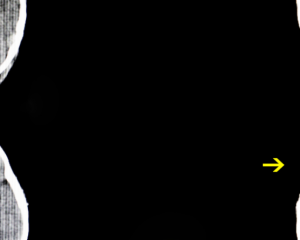Since brain injuries are not visible to the naked eye, someone with a concussion may “look” normal, or be directed to “just walk it off.” This is the worst advice, and medical help should be sought immediately. Concussions can be a very serious injury. Permanent brain damage may occur if left untreated. Getting an MRI after sustaining a head injury could catch any damage that could cause long term complications. One of the most valuable benefits of having an MRI scan after a concussion is obtaining solid information about your condition. You’ll know for sure whether your head injury is serious and if treatment is needed. You can never be too cautious when dealing with a concussion.
What is a Concussion?
A concussion is a type of TBI, or Traumatic Brain Injury, that happens as the result of physical trauma to the brain. They typically occur when someone is hit hard on the head. A concussion is an injury that alters the normal functioning of the brain but does not affect the overall appearance. This damage can disturb how the brain functions temporarily. Concussions can be the root of a person’s sudden changes in behavior.
Concussions have been widely referred to as a bruising of the brain by people who have experienced or witnessed them. Perhaps you were told that you were fine after being hit in the head, or that you should just walk it off. The short-term symptoms of a concussion or TBI do not always show immediately, but that doesn’t mean that the effects down the line are not long-term. Brain injuries, in fact, can have long-term effects for years later.
What Events Could Cause a Concussion or Traumatic Brain Injury?
There are several factors which can determine the extent of your injury, such as force of impact and nature of injury:
- Transportation-related accidents: Car, bicycle, motorcycle accidents, as well as accidents involving pedestrians, are common causes of traumatic brain injury.
- Falls: People are more likely to suffer a TBI from falls on a ladder, out of beds, in the bath, and downstairs.
- Violence: Other causes include domestic violence, child abuse, gunshots, and assaults.
- Combat injuries: Explosive blasts are a leading cause of TBI in active-duty military personnel. Debris, shrapnel, penetrating wounds, and bodily collisions with objects can also contribute.
- Sports related injuries: A TBI may be caused by severe sports injuries like boxing, football, soccer, skateboarding, hockey, lacrosse and other high-impact sports.
Symptoms of a Concussion
A concussion can make you feel confused, or make your brain feel disorganized, making it difficult to concentrate, think, or remember things. You may physically have trouble balancing or trouble seeing. Aside from suffering pain and discomfort, you may also suffer from nausea, vomiting, lack of energy, and extreme fatigue. Also, you may have difficulty falling asleep. It is important to realize that even one of these symptoms can indicate a concussion. Therefore, it is important to know the signs that may signal that you have a concussion. Common symptoms include:
- Problems with Memory or Confusion: During an intense jolt, you might think that you’re someone else or you might forget your name. You might unintentionally yell when telling someone you’re upset. You may also experience confusion or lose control of your emotions.
- Trouble Concentrating.
- Headaches or Migraines: Post-traumatic headache is a typical symptom of TBI. More than 30% of individuals continue to suffer headaches long after the injury.
- Problems balancing or dizziness.
- Feeling fatigued or drowsy: It is common for people with TBIs to experience fatigue, and you may feel the effects of fatigue more often and more quickly than others. It may not be clear why you feel fatigued after traumatic brain injury, but it may be due to the extra effort and attention it takes to even perform simple activities like walking or talking. A head injury may reduce a person’s ability to function as efficiently as he or she was able to do before.
- Vomiting or nausea: Although nausea and vomiting immediately following a concussion could indicate a more severe neurological problem, some people will also have nausea and vomiting days or weeks after a blow to the head. This can be due to vestibular dysfunction. However, it is also linked to migraines.
- Ringing in the ears.
- Having difficulty speaking, slurred words: This includes speaking really fast or really slow.
- Coordination loss.
- The feeling of numbness or weakness in particular body parts.
- Feeling irritable and moody.
- Light and sound sensitivity.
Following a traumatic brain injury, many complications are possible. You could experience altered consciousness, including prolonged changes in responsiveness and comas. You could suffer intellectual changes such as a disability in learning, judgement, and reasoning. It can also affect social behavior. If you experience any of these symptoms you should see a doctor as soon as possible.
What to do after a Concussion
It’s crucial to know what you can and cannot do within the first 48 hours of suffering a concussion. What you do in this time frame can have a major impact on how you will recover.
- Do Not Go To Sleep: You should not go to sleep for at least 3 hours after a concussion. Ensure that you have a responsible adult around to keep an eye on you for signs of your condition worsening.
When you’re the one watching the injured person, continue to make conversation with them. Is their speech slurred? Is the speech coherent? Can they tell you where they are? Do they repeat things? You should take them to the emergency room if they answer yes to any of the above questions.
- Check-In Regularly: This one is for the someone watching the affected person. Every 20 minutes stand them up and have them close their eyes with their feet together. Are they swaying? If their balance is getting worse, take them to the emergency room as soon as possible.
- Check-In Overnight: They can go to sleep or take a nap after 3 hours. During the first night, it is advised that an adult check on the injured person every two hours. Make sure they are breathing okay and look for any other signs their condition may be worsening.
- Do Not Take Medication: Talk to a doctor before taking any pain medication. The symptoms of a worsening condition might be masked by medication, and some painkillers may also contribute to brain bleeding.
- Make a Doctor’s Appointment: Within 2 days of the injury, you should have a full evaluation by an experienced healthcare practitioner skilled in concussion management. It would be ideal to go the same day as the injury or the next day. You can get on the road to recovery sooner if you go to a healthcare provider immediately. They can help you get back to the activities you enjoy if you seek treatment and rehabilitation early.
Benefits of Getting an MRI Scan after a Concussion
MRI plays a crucial role in evaluating patients with brain injury. As technology advances, and as doctors recognize even mild head injuries can have psychological effects, medical imaging of the brain has gained a tremendous amount of momentum, especially as concussions become more common, especially in football. Imaging centers are now using MRI (Magnetic Resonance Imaging) to more clearly picture the effects of concussions and TBIs, instead of detecting only abnormal brain activity with MRIs. MRI scans, up until now, have not been able to recognize the effects of concussions because standard imaging only picks up significant brain damage. However, recent advances in technology have allowed MRI to be used to show tiny holes as well as damage caused by a concussion in the brain and spinal cord. Here are the three most important benefits of getting an MRI after a concussion:
- The Detection of Injuries. An MRI is a powerful tool for diagnosing brain injuries including minute bleeding (micro hemorrhage), small areas of bruising (contusion), and scarring (gliosis). Brain micro bleeds are small, chronic brain hemorrhages caused by abnormalities of the brain’s small vessels. Doctors can detect MBs with MRIs. A cerebral contusion is a bruise of the brain, similar to one seen in other areas of the body. It is created by blood leakage from the vein, artery or capillaries.
- Finding Changes in Brain Function and Brain Atrophy. Nowadays, more modern, specialized MRIs can aid in finding changes in brain structure and function that arise following traumatic brain injuries or analyze the structure of the brain at even higher resolution levels. Following a traumatic brain injury, MRI scans could reveal brain atrophy caused by the disappearance of injured or dead brain tissue. Recent studies suggest that physicians might detect brain changes years after TBI.
Neurologic Predictions for Chronic Disorders. Researchers at a clinical trial examined MRI’s ability to predict patient outcome a few months after concussions to address this clinical need. They followed 135 individuals and checked acute head injuries, determining.





